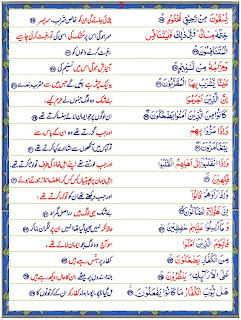Tafseer of Surah Lahab

Most of us know Surah Lahab. It’s one of the first one Muslim children learn these days. We’re going to breeze through the tafseer, then dive into one of the miracles, and finish up with some Arabic analysis.
Allah says:
Translation:
- تَبَّتْ يَدَا أَبِي لَهَبٍ وَتَبَّ
- مَا أَغْنَى عَنْهُ مَالُهُ وَمَا كَسَبَ
- سَيَصْلَى نَاراً ذَاتَ لَهَبٍ
- وَامْرَأَتُهُ حَمَّالَةَ الْحَطَبِ
- فِي جِيدِهَا حَبْلٌ مِّن مَّسَدٍ
May the hands of Abu Lahab be ruined, and ruined is he.
His wealth will not avail him or that which he gained.
He will [enter to] burn in a Fire of [blazing] flame
And his wife [as well] – the carrier of firewood.
Around her neck is a rope of [twisted] fiber. [Surah Lahab, verses 1-5]
Reason of Revelation
This verse was one of the first revealed in Mecca. You can find the full details in Tafsir ibn Kathir. The Prophet (salallahu alayhi wa sallam) was told to proclaim the message; so he went up on a mountain.In those days, when the Arabs attacked, they attacked right at Fajr time, when the most people were sleeping. If anyone saw this, they would get up on a mountain and say “waaaaaaaaaaaah subaaaaaaaaaaahaaaaaaaaaaaah,” like “woe to you from an evil that’s coming in the morning.”
So the Prophet got up on the mountain, and he called each of the tribes, one by one, by name. And when they had all gathered–check this out–he said “If I told you all that the enemy was going to attack you in the morning, or in the evening, would you all believe me?” and they said “we’ve never experienced a lie from you.”
So he (salallahu alayhi wa sallam) said: “Verily, I am a warner (sent) to you all before the coming of a severe torment.”
And this was it! The chance for everyone to become Muslim, Mecca becomes conquered, Islam gets an established base and spreads out of Arabia …
… and Abu Lahab, the uncle of the Prophet, said: “Have you gathered us for this? Tabba lak (may you perish).”
And Allah revealed Surah Lahab.
Points to Consider
- Syed. Abu Lahab was “syed,” (in the broad sense), that is, from the family and clan of the Prophet (not that he was a direct descendant of the Prophet). And he is doomed to Hellfire! So what does that mean for all the syeds out there? Are you still so sure you’ll be saved just for being a relative of the Messenger of Allah? Wake up! You need to pray and fast and pay zakah and make Hajj, just like anyone else.
- Tabbat is a curse. It appears twice in the first ayah–at the beginning, as if it’s a curse, and at the end, as if it’s a statement of reality–that he is cursed.
- Carrier of Firewood. There are two opinions on what this means: One is that the wife of Abu Lahab used to enflame people. “Oh did you hear what so-and-so said about you?” “Oh do you know what that other person did?” To make them hate each other; like she carries the wood to fan the fire. The other opinion is that she used to carry thorns and put them in what pathways the Messenger of Allah used to walk, so he’d be harmed.
- A Necklace of Fire. Hellfire is enough of a punishment–but on top, she’ll be given a necklace of fire. Why? Because she had a beautiful necklace, and she pawned it at a fundraiser so she could use the wealth to harm the Messenger of Allah. So glad tidings O you people who donated for the sake of Allah! Insha’Allah for sure you will get something good, if Allah rewarded giving something bad with something in Hellfire.
The Miracle in Surah Lahab
If you notice, Allah dooms Abu Lahab to Hellfire in this surah. Now, the mufassireen point out an interesting point–at any time, Abu Lahab could have accepted Islam–even as a fake-out. And he could have said “Hey guys, I’m Muslim now, how come the Qur’an is claiming I’m in Hellfire?” And that would’ve caused great fitnah.But he never did.
And Allah knew that he wouldn’t.
And so, we see even in this small, oft-repeated surah, one of the miracles of the Qur’an.
Some Arabic Analysis
- Tabba/Tabbat (تَبَّتْ) is a curse. It means “may you lose everything and perish.”
- Abi Lahab? Just like we discussed in the second post about rabbuka and rabbika, whether you say “Abu Lahab” or “Abi Lahab” or “Aba Lahab,” it’s the same name. Just different grammatical tense.
- Triple Possessive Case: Yahd is mudaaf; abi is mudaf ilayh (hence it’s majroor), and also mudaaf to lahab (which is mudaf ilayh and majroor). If you didn’t understand that, don’t worry.
- Kasaba (كَسَبَ) means “what he accumulated.” Ibn Abbas (radiallahu ‘anhu) says that he accumulated is wealth, and children, and honour, and status; but none of those will help him in the Hereafter.
- Sayaslaa (سَيَصْلَى) is future-tense; it means he (Abu Lahab) will be thrown into.
- Naaran thaata lahab: This construct is difficult to explain, so forgive me if it’s not the easiest thing to understand. If I said “I saw a man dhuw lihyatin,” it means I saw a man who has a beard; or literally, “the owner of a beard.” If I said “I saw a man dhaa lihyatin,” i.e. an adjective construct, it means “I saw a bearded man.” Here, Allah says: naaran thaala lahab, meaning “the fire possessing flame,” or “the flaming fire.” It’s a description of the qualities of that fire. Tafseer ibn Katheer mentions a fire of blazing flames, painful and severe.
Also, I cannot think of any action items related to this surah; so it’s up to you! Whatever you think of, post it in the comments! Insha’Allah you will get a copy of the ajar of anyone else who performs that action.






